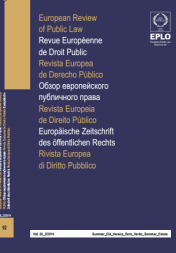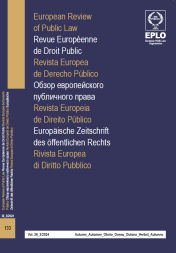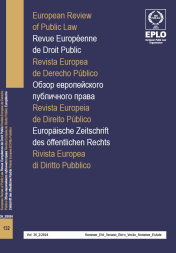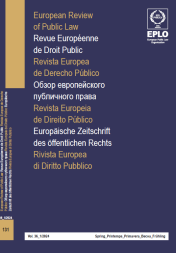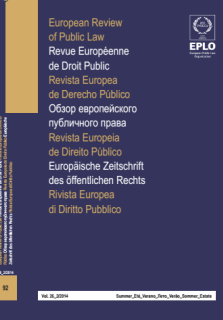
Editorial
ERPL, vol. 26, no 2, summer 2014 (92)
This ERPL issue starts by the speech presented by Jean-Paul Costa, President of the International Institute of Human Rights and former President of the European Court of Human Rights, on the occasion of his award with the "Prix de la tolérance Marcel Rudloff" in March 2014. In this speech, President Costa examines the complex notion of tolerance, which according to him is a great virtue, however not unlimited. He also maintains that one has to distinguish between the form and the substance of tolerance.
In the section of articles, there are six articles on different public law issues. The first study builds on the rereading of Weber that renders legitimization a complex process by associating legitimacy claims of different origins and intends to account for the movement by means of which arise new modes of legitimization in which the administration seeks to anchor its legitimacy directly in citizens. It is in that double perspective that the transformation of modes of consent towards administrative action and the scope of modes of treatment of regulation aiming at obtaining citizens' consent are successively analysed. The second article maintains that in a globalized world, administrative decisions concerning an individual are likely to be determined not only by legal norms originating from the national legal order but also from international institutions or other non-state actors and that the evaluation of the legitimacy of such intertwined decisions requires the detection of interfaces where contributions of different actors are endowed with binding force in another legal theory. This article gives an overview of the circumstances under which such interfaces can be formed and it develops a scheme which allows for the identification of such interfaces in the course of the coming into being of an administrative decision. The influence of interinstitutional agreements, concluded by the Council, the Parliament and the Commission, on the development of the European constitutional law but also the evolution of the EU administrative order, as well as their functions and problems in regard of institutional balance, democratic legitimacy and the knowledge regime are examined in the third article in this ERPL issue through the analysis of three major fields: the comitology committees, the expert groups of the European Commission and the (independent) agencies of the Union. The fourth article sets out a response to the question of what criteria should be followed when attributing criminal liability under administrative sanctioning Law, the question of which natural persons may administratively implicate the legal person, and what the requirements are for doing so. The right to live a free and dignified life laid down by the Italian Constitution, the European Social Charter and the EU Charter of Fundamental Rights entails the right to assistance in situations of need that anyone can experience in his life. This right is examined in the fifth article of this ERPL issue as concerns more specifically the Italian situation. In particular, this article examines the modifications of the norms on access and on the modalities of determination and the scope of the Indicator that will constitute an instrument for the evaluation of the economic situation of those requesting a facilitated access to social provisions and refers to the entering into force within 2016 of a new form of control on the standard costs of social assistance. Last but not least, in the final article in this ERPL issue, is maintained that in Italy, although cultural interventions are udertaken at the public power's discretion, an active political action should be desirable also for the positive impact the offer of cultural services would have on both economy and employment and this issue is examined as concerns also the EU legal system provisions.
In the section of chronicles on Constitutional Law, the chronicle coming from Cyprus examines the decision of the Supreme Court in the case of the recourses filed by District Court and other first instance judges of the Republic of Cyprus against the administrative decisions with regard to the deduction from the judges' salaries.
Another chronicle deals with the issue of the increased use of parliamentary investigations in order to support efficient control of the Danish Parliament over the government. The author of this chronicle is of the opinion that it is most preferable to use a model which formalises and professionalises the investigation body without allowing to ask other persons than the minister.
The following chronicle discusses the Georgian Law on freedom of speech and expression and the main provisions of the Georgian Constitution, which protects the freedom of speech on the territory of Georgia.
In the following chronicle on Constitutional Law, the relevant developments in Italy during the year 2013 are examined. In the context of the political and institutional crisis, after the electoral results which did not allow the identification of a political coalition able to guarantee a qualifying majority both in the Chamber of deputies and the Senate and to secure the formation of a government, the President of the Republic, Giulio Napolitano, has played a key role in driving and guaranteeing national unity.
Next, the Russian constitutional developments in 2013 are analysed, such as the decisions of the Constitutional Court concerning the election process and voting rights, the abolition of the Supreme Arbitration Court, the measures taken to strengthen national security protection as well as the restriction of the rights of sexual minorities and blasphemers.
Next, in the section of Administrative Law, a chronicle coming from France refers to the law recognising the principle according to which the silence of the administration has to be considered as acceptance as well as to the case law of the year 2013, where litigation was categorised rather harmoniously on the basis of the main branches of administrative law. Finally, case law concerning the voie de fait and the emprise irrégulière are pointed out.
The next chronicle comes from the Netherlands and presents developments in the field of Administrative Law, among which with regard to the uniformity and transparency of the legal system as a whole and of administrative law in particular, the Minister of the interior's proposal to abolish two of the supreme administrative courts, and the boundaries between private law and public law.
The chronicle on Russian Administrative Law is devoted to the main tendencies of administrative legal regulation of the housing relations, antimonopoly control and administrative liability for antimonopoly legislation infringements, as well as to system modifications in the regulation of the State and public corporate procurements in Russia.
In the section of Jurisprudence, the chronicle on the CJEU Jurisprudence provides an overview of the 28 cases that were deemed to bear the highest level of importance and were selected for publication in the 'Reports of Judgments and Decisions 2013'. Discussion in this chronicle is structured around different headings, with reference to the main Convention Article concerned.
The next chronicle on European Union Jurisprudence regards two judgments of the Civil Service Tribunal (CST), which have not been appealed, concerning the contractual policy of the ECB and its disciplinary regime (BM cases) and a judgment of the GC, taken following an appeal against a judgment of the CST in the field of pensions (Heath case).
The chronicle on French Constitutional Jurisprudence covers the constitutional law of 2012, both in the framework of the a priori legislation and in that of the a posteriori legislation, whereas the electoral legislation is also presented.
This ERPL issue is concluded by the Book Reviews Section, in which two Book Reviews chronicles presenting and commenting on latest editions in France and Italy respectively are included. In addition, reviews on books received by the EPLO are included in this section.
Overall, this is an issue of the ERPL where, as is the standard pursued by the Review, many topical issues are discussed and a multinational overview of developments in the Constitutional and the Administrative Law of several countries is given.
SUMMARY / SOMMAIRE
PRIX DE LA TOLÉRANCE 2014
J.-P. COSTA, President of the International Institute of Human Rights, former President of the European Court of Human Rights [IN FRENCH]
ARTICLES
G. TIMSIT, The Legitimization of the Administrative Action [IN FRENCH]
K. MEYER, Interfaces as Structural Elements of the International Administrative Relations and their Place in the Area of International Administration - An Analysis of the Influence by International and National Actors in the Coming into Being of an Administrative Decision [IN GERMAN]
A. PILNIOK, Structural Development through Interinstitutional Agreements in the EU Governance System? On the Importance of Interinstitutional Agreements in the EU Executive Order [IN GERMAN]
M. GÓMEZ TOMILLO, The Criminal Liability of Legal Persons and Administrative Sanctioning Law: Criteria for the Objective Attribution of Liability [IN ENGLISH]
P. BONETTI, Social Assistance Services and their Current Probelms in Italian Constitutional Law [IN FRENCH]
L. DEGRASSI, Cultural Services and Constitutional Purposes (Italy and the EU) [IN ENGLISH]
CHRONICLES / CHRONIQUES
I. Constitutional Law / Droit constitutionnel
M. NICOLATOS, Cyprus / Chypre [IN ENGLISH]
M. H. JENSEN, Denmark / Danemark [IN ENGLISH]
I. KALANDADZE, Georgia / Géorgie [IN ENGLISH]
CH. MARTINI / F. TEDDE, Italy / Italie [IN ITALIAN]
A. KHURSHUDYAN/ O. KUDRYASHOVA / D. KUSTOV / S. OLENNIKOV / M. SUHODOLOV, Russia / Russie [IN ENGLISH]
II. Administrative Law / Droit administratif
B. DELAUNAY, France [IN FRENCH]
A. BUIJZE, The Netherlands / Pays-Bas [[IN ENGLISH]
Р.Б. ДЗБОЕВА / К.А. ПИСЕНКО / В.В. КИКАВЕЦ, Russia / Russie [IN RUSSIAN]
III. Jurisprudence
CH. NIKOLAIDIS, European Court of Human Rights / Cour européenne des droits de l'homme [IN ENGLISH]
C. A. VASSILOPOULOS, European Union / Union européenne [IN ENGLISH & FRENCH]
B. MATHIEU / M. VERPEAUX, Constitutional Jurisprudence / Jurisprudence constitutionnelle,France [IN FRENCH]
BOOK REVIEWS / NOTES BIBLIOGRAPHIQUES
B. PACTEAU [IN FRENCH]
M. BENEDETTI / S. MORETTINI [IN ITALIAN]
BOOKS RECEIVED / LIVRES REÇUS [IN ENGLISH]















